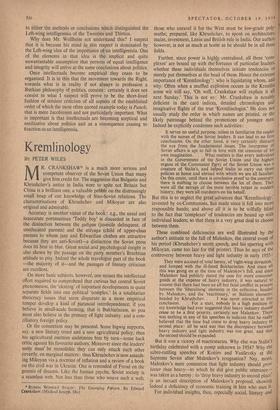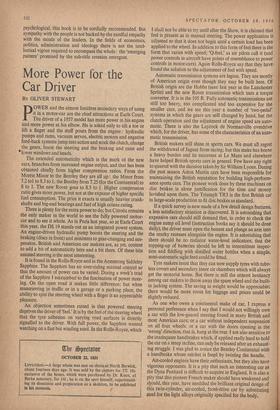Kremlinology
By PETER WILES MR. CRANKSHAW* is a much more serious and competent observer of the Soviet Union than many give him credit for. The suggestion that Bulganin and Khrushchev's antics in India were to spite not Britain but China is a brilliant one, a valuable pebble on the distressingly small heap of our knowledge of Sino-Soviet relations. The characterisations of Khrushchev and Mikoyan are also original and admirable.
Accuracy is another virtue of the book : e.g., the usual and inaccurate portmanteau 'Teddy boy' is discarded in face of the distinction between the guligan (juvenile delinquent, of uneducated parents) and the stilyaga (child of upper-class parents to whom jazz and Edwardian clothes are attractive because they are anti-Soviet)—a distinction the Soviet press does its best to blur. Great social and psychological insight is also shown by the passage on the party member's Brechtian attitude to pity. Indeed the whole travelogue part of the book —the majority of it—and the passages of literary criticism are excellent.
On more basic subjects. howevet/, one misses the intellectual effort required to comprehend that curious but central Soviet phenomenon. the 'clotting' of important developments in quite separate fields into one political 'complex.' In a totalitarian theocracy issues that seem disparate to a more empirical temper develop a kind of paranoid interdependence; if you believe in small-scale farming, that is Bukharinism, so you must also believe in the primacy of light industry. and a con- ciliatory foreign policy.
Or the connection may be personal. Some bigwig supports, say. a new literary trend and a new agricultural policy; then his agricultural enemies undermine him by turn—some hack critic against his favourite authors. Moreover since the leaders' unity must be monolithic they can only attack each other covertly, on marginal matters: thus Khrushchev is now assault- ing Mikoyan via a doctrine of inflation and a review of a book on the civil war in Ukraine. One is reminded of Freud on the genesis of dreams. Like the human psyche, Soviet society is a seamless web. Not less than those who weave such a web, • RussiA WITHOUT STALIN: The Emerging Pattern. By Edward rankshaw. (Michael Joseph, 18s.) those who unravel it for the West must be low-grade pol; maths; prepared, like Khrushchev, to spout on architecture, maize, investment, Lenin and British rule in India. Our author. however, is not as much at home as he should be in all these fields.
Further, since power is highly centralised, all these 'con plexes' are bound up with the fortunes of particular leader whether these individuals themselves initiate tendencies ( merely put themselves at the head of them. Hence the extreir importance of `Kremlinology': who is liquidating whom, an why. Often when a muffled explosion occurs in the Krcmli some wit will say, 'Oh well, Crankshaw will explain it a next Sunday.' This is not so : Mr. Crankshaw is notabl deficient in the card indices, detailed chronologies an imaginative flights of the true 'Kremlinologist.' He does n( usually study the order in which names are printed, or th likely patronage behind the promotions of younger men Indeed he explicitly condemns such activities: It serves no useful purpose, unless to familiarise the read
e
with the names of the Soviet leaders. It can lead to no firs conclusions. On the other hand, it very certainly distract the eye from the fundamental issues. The interpreter r Soviet affairs is apt to fall in love with the creations of h own imagination. . . What matters is that every individuc in the Government of the Soviet Union and the highe! organs of the Communist Party of the Soviet Union was creature of Stalin's, and helped Stalin to carry out thos policies at home and abroad with which we are all familial On this count, until there is conclusive proof to the contrar) there is nothing to choose between the lot of them. The were all the satraps of the most terrible tyrant in model history; they were all murderers on his behalf.
But this is to neglect the great advances that `Kremlinology invented by ex-Communists, has made since it fell into more responsible hands; and above all it is to be wilfully blind controversy between heavy and light industry in early 1955 with to the fact that 'complexes' of tendencies are bound up individual leaders; so that there is a very great deal to choose between them.
These combined deficiencies are well illustrated by the author's attitude to the fall of Malenkov, the central event of his period (Khrushchev's secret speech, and his sparring with Mikoyan, came too late for the printer). Thus he says of the They were accused of total heresy, of 'right-wing deviation.' and lumped with the ill-fated Bukharinites. And since all this was going on at the time of Malenkov's fall, and since Malenkov had publicly stated the case for more consume goods at the expense of heavy industry, it was natural I( assume that there had been an all but fatal conflict in process between the liberalising' elements in the collective, header by Malenkov, and the 'reactionary,' or Stalinist elements headed by Khrushchev. . . . I was never attracted to thi conclusion. . . For a start, nobody in a high position t( my knowledge had ever suggested that heavy industry shoul( cease to be a first priority, certainly not Malenkov. Theo was nothing in any of his speeches to indicate that he real!! believed that the time had come to drop heavy industry t( second place: all he said was that the discrepancy betwect heavy industry and light industry was too great, and tha the second should be expanded.
But it was a victory of reactionaries. Why else was Stalin': birthday celebrated with a pomp unknown in 1954'? Why 0( sabre-rattling speeches of Koniev and Vasilevsky at th( Supreme Soviet after Malenkov's resignation? Nay, more Malenkov's mere contention that light industry should 1,7rolt faster than heavy—to which he did give public utterance— was taken as a heresy : to 'drop heavy industry to second place is an inexact description of Malenkov's proposal, showii4 indeed a deficiency of economic training im him who uses it For individual insights, then, especially social, literary and
d
1 psychological, this book is to be cordially recommended. But sympathy with the people is not backed by the needful empathy with the minds of the leaders. In the fields of economics, politics, administration and ideology there is not the intel- lectual vigour required to encompass the whole : the 'emerging pattern' promised by the sub-title remains emergent.



































 Previous page
Previous page